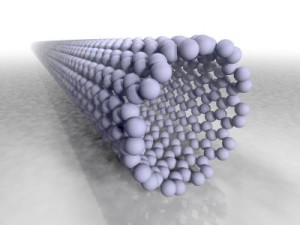 Replacing silicon transistors with carbon nanotubes could make any electronic device – smartphones, laptops, tablets and supercomputers – smaller and more powerful.
Replacing silicon transistors with carbon nanotubes could make any electronic device – smartphones, laptops, tablets and supercomputers – smaller and more powerful.
“This could be a revolutionary technological leap,” said Dan Olds, an analyst at The Gabriel Consulting Group.
“It takes much less power to change the state of a carbon nanotube versus today’s transistors,” Olds said. “Nanotubes are much better at dissipating heat. You can pack more nanotube transistors onto a chip. We would see devices that can do a whole lot more useful work while using a whole lot less juice – and that’s a great combination.”
Scientists at Stanford University last week announced they had built the first functioning computer that used only carbon nanotube transistors.
Carbon nanotubes could launch a new generation of faster electronic devices that use less energy than those built using silicon-based transistors, according to the Stanford team.
Last week’s announcement was the product of years of research into the new semiconductor material.
“People have been talking about a new era of carbon nanotube electronics moving beyond silicon,” said Stanford professor Subhasish Mitra. “But there have been few demonstrations of complete digital systems using this exciting technology. Here is the proof.”
A change from silicon to nanotech has the potential to be revolutionary as it would affect a basic technology building block.
The transistor is considered by many researchers and analysts to be the single-most important invention of the 20th century. It’s the building block for the processor. Without it, some say servers would be three stories high, and laptops would be a prop on Star Trek. Television sets would still use vacuum tubes, and GPS wouldn’t exist.
Physicist Michio Kaku, a professor of theoretical physics at City University of New York, has been predicting the demise of Moore’s law due to the limitations of silicon technology.
Heat generation and electrical leakage have been the major issues derailing incremental progress – the smaller transistors get, the more heat and leakage worsen. Carbon nanotube transistors, would let developers sidestep that problem, enabling chip makers to put more and more transistors on a chip.
“Moore’s Law is based on silicon,” said Patrick Moorhead, an analyst at Moor Insights & Strategy. “If this technology is successful, it should force us to replace Moore’s law with one based on the newer technology.”
“Hypothetically, if researchers can remove the current issues by using carbon nanotubes, and manufacturers adopt it, they could build smaller everything with less power required,” he added.
Moorhead said if carbon nanotubes become a viable alternative to silicon, major manufacturers like Intel, Samsung and TSMC should quickly look to move to the new technology, despite the high cost of reworking their manufacturing processes. “The new technology would impact every device that uses chips, from cars to watches to phones to computers,” he added.
Charles King, an analyst with Pund-IT, threw a bucket of realism on the discussion, noting that not every research project leads to commercially viable products.
Analysts say that if the Stanford researchers are right, we could see computers built on carbon nanotubes in five to 10 years. Others say it would take a lot longer.
“Hard to tell until we see more,” said Rob Enderle, an analyst with the Enderle Group.
“Like a lot of promising technologies, this not only has to work, it has to work better than alternatives and the bar for that last part is still moving on Moore’s law. However it looks to be within a five-to-15-year horizon for viable product at low volume,” Enderle said.





